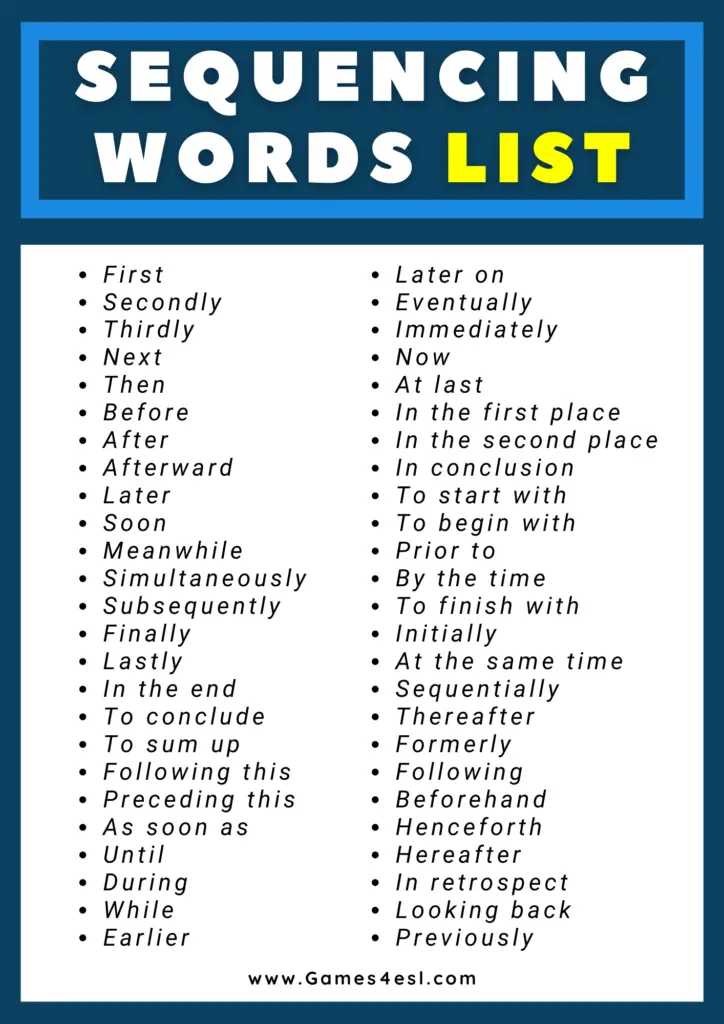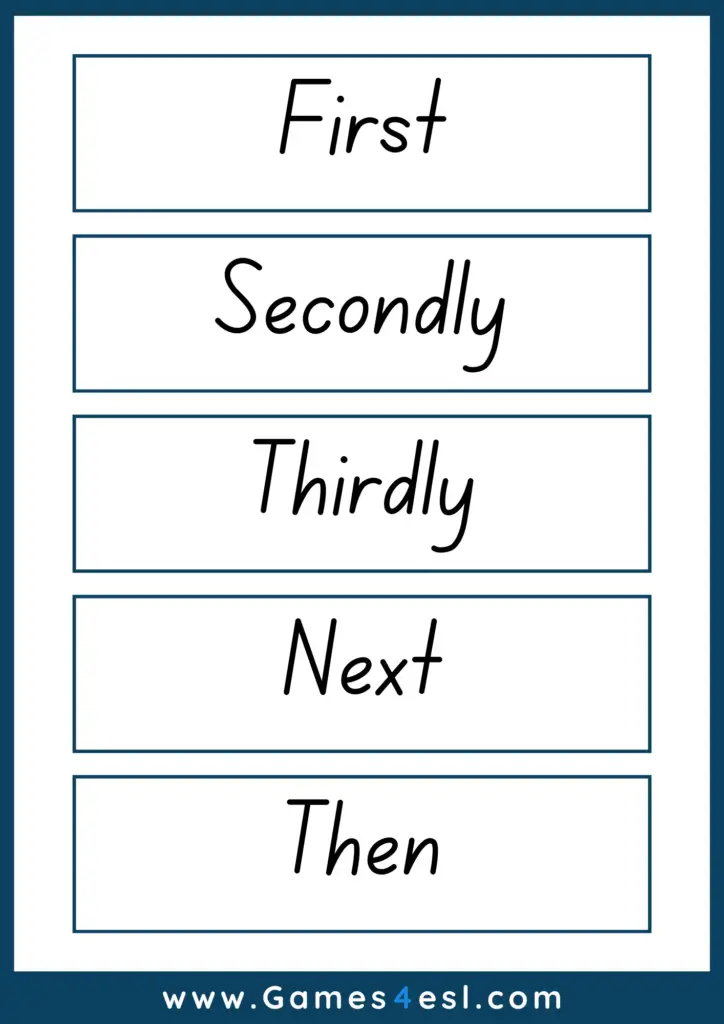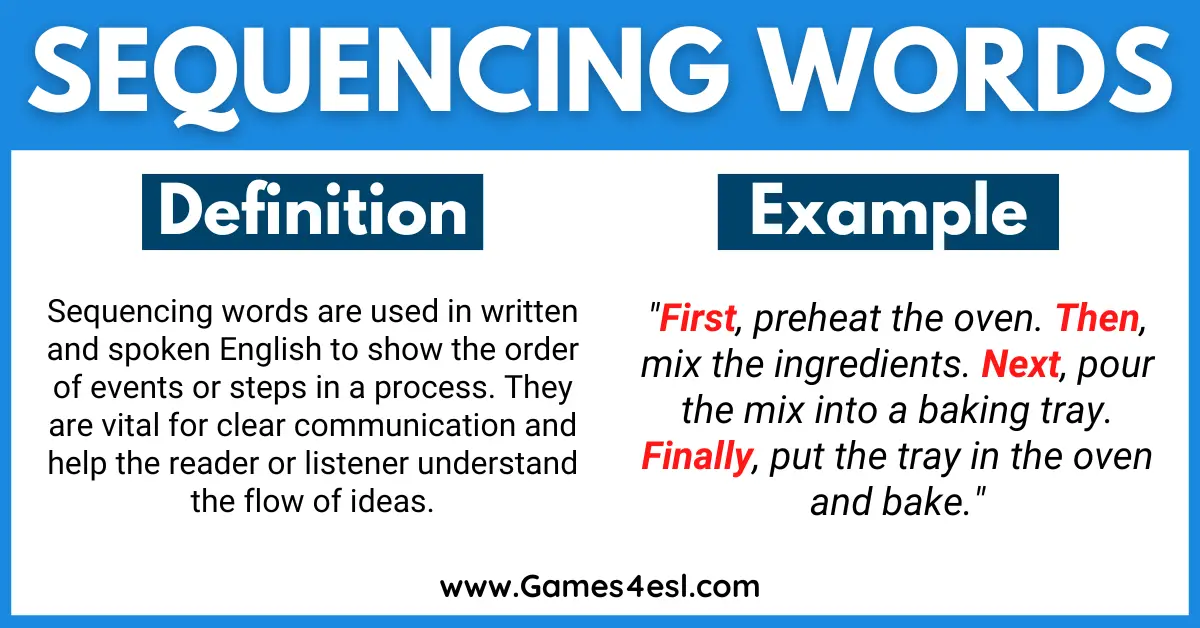Master English Sequencing Words: Useful Guide with Lists, Examples, and Flashcards
Sequencing words are very important in the English language. They make stories, explanations, and instructions easier to understand. They also help to make our speaking and writing clear and organized.
To help you learn or teach about sequencing words, we have put together this detailed guide. Below we will explain what sequencing words are and provide an extensive list of sequencing words together with example sentences. We will also share some free flashcards you can use to learn or teach these sequencing words. First, let’s take a look at what sequencing words are.
What Are Sequencing Words?
Sequencing words are used in written and spoken English to show the order of events or steps in a process. They are vital for clear communication and help the reader or listener understand the flow of ideas.
For example, if you are telling someone how to bake a cake, you would use sequencing words like “first,” “then,” “next,” and “finally.” You might say: “First, preheat the oven. Then, mix the ingredients. Next, pour the mix into a baking tray. Finally, put the tray in the oven and bake.“
Sequencing words in English can be classified into different types based on the specific sequence or order they indicate. Here are the main types of sequencing words:
- Sequencing Words Indicating Beginning: These are used to introduce the first point or step in a series. Examples include “firstly,” “to start with, “initially,” “to begin with,” and “in the first place.”
- Sequencing Words Indicating Middle: These sequencing words signal a transition to a point or step in the middle of a series or process. Examples include “secondly,” “next,” “then,” “after that,” “meanwhile,” and “simultaneously.”
- Sequencing Words Indicating End: These words indicate the final point or step in a series. Examples are “finally,” “lastly,” “in the end,” “to conclude,” and “ultimately.”
- Sequencing Words for Describing Procedures or Steps: These words are helpful when explaining a process or a series of actions or events in a particular order. They include “first step,” “second step,” “next step,” “last step,” “following step,” and “preceding step.”
- Sequencing Words Indicating Chronology: These sequencing words denote the chronological order of events, particularly in narratives. Examples are “prior to,” “preceding,” “subsequent to,” “before,” “after,” “earlier,” “later,” “soon,” “then,” “while,” “as soon as,” “by the time,” and “until.”
- Sequencing Words Indicating Flashbacks or Retrospection: These words are used when recalling past events or reflecting on past experiences. Examples include “looking back,” “in retrospect,” “years ago,” and “at that time.”
Why Are Sequencing Words Important To Learn?
Understanding and using sequencing words effectively is crucial for both English language learners and native English speakers for several reasons:
- Clarity and Coherence: Sequencing words help to arrange thoughts, actions, or events in a logical order. This makes the information more digestible and easier to follow for the reader or listener.
- Narration and Explanation: When telling a story or explaining a process, sequencing words are used to indicate the order of events, making the narrative or instructions easier to understand.
- Effective Communication: In both written and spoken English, sequencing words facilitate smooth transitions between ideas, improving the overall flow and coherence of the communication.
- Academic and Professional Writing: In academic or professional writing, it’s important to organize ideas and arguments logically. Sequencing words are tools that help structure these writings effectively.
- Reading Comprehension: For language learners, understanding sequencing words can improve reading comprehension, as it helps them follow the thread of the text and understand the order of events or the logical progression of an argument.
- Language Proficiency: Finally, the correct use of sequencing words demonstrates a high level of language proficiency, as it shows a command of more complex sentence structures and the ability to express thoughts in a clear and organized manner.
List Of Sequencing Words
Here’s an extensive list of sequencing words. If you would like to download and print a PDF of this list, you can do so below.
- First
- Secondly
- Thirdly
- Next
- Then
- Before
- After
- Afterward
- Later
- Soon
- Meanwhile
- Simultaneously
- Subsequently
- Finally
- Lastly
- In the end
- To conclude
- To sum up
- Following this
- Preceding this
- As soon as
- Until
- During
- While
- Earlier
- Later on
- Eventually
- Immediately
- Now
- At last
- In the first place
- In the second place
- In conclusion
- To start with
- To begin with
- Prior to
- By the time
- To finish with
- Initially
- At the same time
- Sequentially
- Thereafter
- Formerly
- Following
- Beforehand
- Henceforth
- Hereafter
- In retrospect
- Looking back
- Previously
Download PDF List

Sequencing Words – Example Sentences
Here are many example sentences to help you learn and understand how to use these sequencing words correctly.
Sequencing Words Indicating Beginning
- “First, let’s gather all the ingredients.”
- “First of all, I would like to thank everyone for being here.”
- “To start with, we need to prepare the dough.”
- “In the first place, we must ensure our safety.”
- “Initially, I was hesitant to try rock climbing.”
- “To begin with, we must define the problem.”
Sequencing Words Indicating Middle
- “Secondly, let’s discuss the budget for this project.”
- “Next, chop the vegetables.”
- “Then, we’ll add the chopped vegetables to the pan.”
- “After that, we will let the mixture cook for a while.”
- “Following that, the quarterly sales figures improved.”
- “Subsequently, she went on to win the award.”
- “Meanwhile, I’ll prepare the dessert.”
- “Simultaneously, we will launch the two marketing campaigns.”
Sequencing Words Indicating End
- “Finally, we have completed the project.”
- “Lastly, I would like to thank my family for their support.”
- “In the end, it’s the effort that counts.”
- “To conclude, I will restate my main argument.”
- “Ultimately, our goal is customer satisfaction.”
Sequencing Words for Describing Procedures or Steps
- “The first step is to preheat the oven.”
- “The second step involves mixing the ingredients.”
- “The next step is to pour the mixture into the pan.”
- “The last step is to let it bake for 30 minutes.”
- “The following step includes decorating the cake.”
- “The preceding step was to whip the cream.”
Sequencing Words Indicating Chronology
- “Prior to starting the project, we need to finalize the plan.”
- “In the preceding years, our profits have been declining.”
- “Subsequent to the meeting, we will share the minutes.”
- “Before we proceed, let’s review our guidelines.”
- “After the event, we will gather for a debriefing.”
- “The garden was lush earlier in the spring.”
- “Later, we’ll catch up for a coffee.”
- “Soon, the sun will set.”
- “Then, I realized I had forgotten my wallet.”
- “While I was cooking, the phone rang.”
- “As soon as the bell rang, the children rushed out.”
- “By the time we got there, the show had started.”
- “We will continue our work until the task is completed.”
Sequencing Words Indicating Flashbacks or Retrospection
- “Looking back, I can see how much I’ve grown.”
- “In retrospect, I would have done things differently.”
- “Years ago, we used to vacation here every summer.”
- “At that time, I was not aware of the consequences.”
Sequencing Words Flashcards

Flashcards can be incredibly useful when teaching or learning sequencing words. Download and print these sequencing word vocabulary cards and use them in class today!
More Vocabulary Lists
Thanks for reading. I hope you found this guide on sequencing words useful. Before you go, check out our other English Vocabulary Lists By Topic for more useful resources for teaching and learning English.


